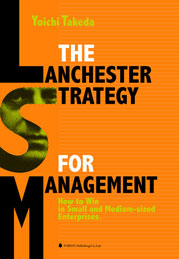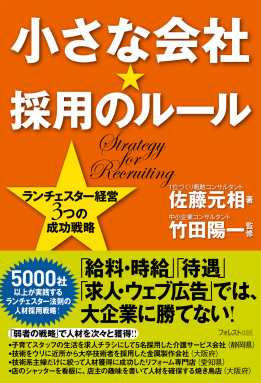How to Win in Small and Medium-sized Enterprises.
THE LANCHESTER STRATEGY FOR MANAGEMENT
竹田 陽一 著
2,750円(税込)

Introductuon
Lanchester’s laws were originally presented as laws of combat, but in Japanthey have been adapted into "laws of competition." If one applies
Lanchester’s laws to business strategy, previously vague aspects of running
a business become clearer, so it becomes easy to apply them to actual
business situations. When these laws are applied to business, the following
things become clarified.
First is the relationship between market share and profitability.
Second, distinctions can be made between the "strategy of the strong" that
can be implemented by the company fulfilling the conditions necessary to
become top-ranked, and the "strategy of the weak" that must be implemented
by those, including the second-ranked company, that have failed to meet
those conditions.
Third, specific weightings can be assigned to products, their marketing
strategies and tactics, and other such important factors and attendant
procedures comprising a business.
I believe that these ideas, which until now seem to have escaped the
attention of guru consultants in the United Kingdom and the United States,
constitute a novel approach.
Author Profile
Yoichi Takeda was born in October, 1938, in Kurume, Japan. After completinghigh school, he graduated from the economics school at Fukuoka University.
After working in the back office for a building materials manufacturer, at
the age of 27 he switched to working for a market research company, where he
did credit checks on small businesses and post mortem analyses of companies
that went bankrupt.
Takeda first encountered Lanchester’s laws when, at 35 years old, he
attended a seminar on the subject. Since then, his interest in Lanchester
never abated. At the age of 44, he began business consulting based on
Lanchester’s laws, lecturing all over Japan. He has visited Lanchester’s
grave half a dozen times, translated some of his works, and in October,
2013, at the beginning of the one-hundredth year since Lanchester’s laws
became public, he conducted eleven seminars in different parts of Japan to
commemorate the occasion. He has published a number of books in Japanese.
Contents
ForewordChapter 1: A General Perspective on Business and its Essential Components
1. A Scientific Approach to Solving Problems
2. A Company Survives on Gross Profit
3. Eight Essential Components of a Business
4. How to Prioritize the Eight Essential Components of a Business
a. Using Weights for Traveling Sales
b. Weighting Sales Versus Product
c. The Front Lines Versus the Back Office: A 4-to-1 Disparity
Chapter 2: The Principle of Profitability and Market Share
Introduction
1. Three Milestones of Market Share
2. The Relation Between Market Share and Profitability
3. Why Does Profit Accrue When Market Share Increases?
4. Three Big Activities in Sales
5. Five Reasons Why the Top Company’s Profits Keep Increasing
6. Location Determines Profit from Annual Sales
7. It All Depends on the President’s Mettle
Chapter 3: Procedures and their Weightings
Introduction
1. Military Procedures for Planning a Campaign
2. Ambition, Objective, Goals
3. What Tactics Means
a. Roles of the Corporal and of the Tactical Leader
4. What Strategy Means
a. Principal Roles of a General
(1) A general is confident of winning when entering a battle
(2) A general picks battles wisely
(3) A general should have a clear and worthy cause when going to war
(4) A general gathers intelligence about the enemy
(5) A general going into battle must decide which weapons to use in the main and which to use as auxiliary
(6) A general chooses where to fight and delineates the boundaries of the battlefield
(7) A general prudently selects a route for marching to the battlefield
(8) A general determines the battle formation when fighting is imminent
(9) A general organizes detachments and appoints officers
(10) A general decides methods for education and training
(11) A general calculates the expenses of a campaign and decides how to obtain and allocate funds
(12) A general determines ways to maintain supplies of arms and provisions
(13) A general draws up a battle plan and conveys it to subordinates
b. Summary of the Roles of a General
5. Duties to be Discharged by the President
a. In Business, Be Like a General in Observing People
b. Success is Determined by How Soon the President Leaves the Front Lines
6. Most People Misunderstand Strategy
7. Weighting the Procedures
8. Weights for the Whole Business
a. Overall View of a Business. Takeda Business Model
b. Weighting Elements of the Whole Company
9. With 30 Employees, the President Determines 98% of Performance
10. Pareto Principle Seen in the President’s Power
Chapter 4: Principles of Lanchester’s Laws
1. Lanchester’s Laws
2. Lanchester’s Laws in Business
a. How to Increase Sales Performance
b. Floor Area and Sales in Department Stores
a. The Case of Hiroshima City
b. The Case of Kumamoto
3. Lanchester’s Laws and Strategic Concepts
4. Two Strategic Concepts
A. Strategic Concepts for the Dominant Army
B. Strategic Concepts for the Lesser Army
A. Business Strategy Concepts for the Strong
B. Business Strategy Concepts for the Weak
5. Market Share Separates the Strong from the Weak
a. The Difference between Strategic Attacks and Tactical Attacks
b. Two-Thirds Allocation to Strategic Attacks
c. Three Milestones of Market Share
d. Three Milestones of Market Share, Absent fro American Marketing
6. Three Conditions for Being Strong
7. The Law of the Death-Line
8. ABCs of the Weak Company
Chapter 5: Business Strategies of the Strong
1. The Strong Company Aspires to be Number One on All Fronts
2. The Strong Company Emphasizes Products for Large-Scale Markets
a. The Strong Company Gives Priority to Frequently Used Products
b. The Model of the Top Product is Periodically Renewed
3. The Strong Company Broadens its Product Mix
a. The Strong Company Makes Multiple Brands
b. The Strong Company Develops New Products
c. The Strong Company Advances into Related Fields
4. The Strong Company Works in Big Cities
5. The Strong Company Extends Everywhere
6. The Strong Company Uses All Distribution Channels
7. The Strong Company Targets Big Industries and Big Segments
8. The Strong Company Sells Indirectly Through Wholesalers
9. The Strong Company Advertises in Mass Media
10. The Strong Company Augments Quantity, Then Quality
11. The Strong Company Heads Off Weak Companies
12. The Strong Company Retaliates When a Weak Company Introduces a New Product
13. The Strong Company Does Business in a Suit of Armor
14. A Rising Star Needs the Product Strategy of a Strong Company
15. The Strong Company May Actually be a Hybrid
16. Wrap-up of Strategies of the Strong
Chapter 6: Business Strategies of the Weak
Part 1: Setting a Weak Company’s Goals
1. Shoot for the Stars
2. Have War Goals and Battle Goals
a. A Weak Company Lashing Out at a Strong Company Will Fail
b. A Weak Company Should Target a Doomed Company
3. Be Distinct from Other Companies
4. Be the Big Fish in a Small Pond
a. Better than Being a Small Fish in a Big Pond
b. Learn about the Many Success Stories
c. The Way to the Top is Not in the Accounting Ledger
5. Find the Goals in the Details
6. Winnowing the Options to Reach the Top
a. How to Select the Best Product
b. How to Select the Best Region
c. How to Select the Best Industry or Customer Segment
7. Keep the Scope Limited
a. Scope of the Products
b. The Scourge of Too Many Products - 0
c. Scope of the Business Region
d. Track Profits District by District
e. Scope of Retail Stores and Restaurants
f. Scope of Industry and of Customer Segments
8. Get Directly to the End User
9. Gather First-Hand Intelligence
10. Wrap-up on Setting Goals
Part 2: Running a Weak Company
1. Make the Goal a Sure Thing
a. How to Achieve Victory Depends on Time Needed to Get There
b. Ransack Workers from Unproductive Operations
c. Be Decisive or Forget it
d. Success Stories
2. How to Do it Wrong
3. Innovate, Innovate, Innovate!
4. Eradicating Nonsense - the Lite Company
5. Don’t Show your Hand to the Dealer
6. Wrap-up on Running a Weak Company
Part 3: The Importance of Time on the Job
1. Enthusiastically Aspire to Make the Best Company
a. How an Active Person Thinks
b. How a Passive Person Thinks
c. Business Must be in Active Mode to be Viable
2. The Early Bird Catches the Worm
a. Use a Time Strategy that Makes Success Certain
b. Show up at Work by Seven-Thirty
3. Using Time Effectively
a. The President is Responsible for Allocating Time
b. A Formula for Learning Effectiveness
4. Arguments Against the Time Strategy
5. Elements of Time Management and Their Weights
6. Keep Persevering Until the Goal is Attained
a. Most People Give up Before a Competitive Product Is Ready
b. Getting a New Product onto Market Shelves Takes Time
7. Time Strategy Changes into Ambition and Passion
8. People Brought up in Adversity Know Strategies of the Weak
9. Don’t Be Intoxicated by a Little Success
10. Wrap-up on the Importance of Time on the Job
11. What This Whole Book Comes Down To
a. The Widely Applicable Strategies of the Weak
b. The President’s Effectiveness Shows Up in the Bottom Line
Postscript
Reference Data
1. Annual Gross Profit Per Employee for Small Businesses
2. Annual Net Profit Per Employee for Small Businesses
About Frederick W. Lanchester
[Bibliography]
About Yoichi Takeda
 著者について
著者について
-
中小企業コンサルタント、ランチェスター経営株式会社代表。
View More
福岡県久留米市出身。福岡大学経済学部卒業後、建材メーカーで経理と営業を経験。28歳の時に企業調査会社、株式会社東京商工リサーチに転職。34歳のときセミナーに参加してランチェスターの法則と出合う。44歳の時に起業してランチェスター経営を創業。以後、全国を講演で回り、講演回数は4300回を超える。
また、中小企業の社長向けに経営戦略CD150巻、DVD100巻を制作・販売している。中小企業コンサルタントの名手として、不動のポジションをキープし続けている。この間、法則の生みの親となったフレデリック・ランチェスター氏の墓参りを7回している。
著書に、『ランチェスター弱者必勝の戦略』(サンマーク出版)、『社長のためのランチェスター式学習法』『1枚のはがきで売上を伸ばす方法』(以上、あさ出版)、『小さな会社★社長のルール』『なぜ、「会社の数字」は達成されないのか?』『THE LANCHESTER STRATEGY FOR MANAGEMENT(英文のランチェスター戦略)』(以上、フォレスト出版)がある。
ホームページ http://www.lanchest.com/













